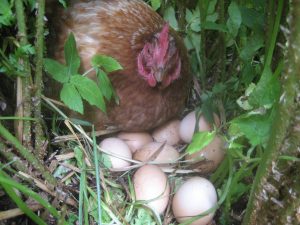
It was Braveheart who first began to lay eggs all over the garden. The others then began to follow her lead, and soon it became a daily routine: trying to find their new nesting places…
If you scroll back down to my previous blog, you will see a photograph of me mowing our labyrinth, with three hens keeping me company. I don’t know where the other two were at the time, but roundabout for sure. Until that time I had never known that chickens were such social creatures.
Last night, settling down for Sunday night curry, Akii came in looking upset (probably fearful of my response) and said, “It’s Bravey… she’s been hit by a car.”
He always called her Bravey, considering Braveheart a bit of a mouthful, which it most certainly is, but that is what I called her the day she led the others out of their crate of arrival, and for me at least it stuck.
I blame Liona. It was she who announced at a PW meet one first Saturday of the month that she had to find homes for 1,500 hens, to save them from certain death, most probably towards being turned into pet food or simply incinerated.
Liona, who manages The Egg Shed on a farm just outside Dunkeld, explained that at 18 months chickens are regarded as not commercially viable as eggshells begin to thin and weaken. So they had to go. Shocking or what…
Me being me, up shot my arm and I offered to take seven. On reflection, however, we decided on five, and then realised we would need to house them. Fortunately Liona knew a woman on the way to Pitlochry who had a coop, and another of her many friends brought it over on his truck. Finally neighbour Raymond came down with a cage that fit one end of the coop as if made to measure.
We then explored the agricultural store Davisons in Blairgowrie, which we had never even previously properly registered let alone gone into, and found not only the hen food and nest box hay we needed, but all sorts of amazing products for farm animals in general. Talk about eye-opening.
When Liona brought the crate, with two older birds and three younger, it was Braveheart – with lovely copper-coloured feathers – who led the way out, into the cage and then up the ladder into the coop itself. The next morning she was first out, and stayed pretty much the leader thereafter.

Always at my feet, taking the lead…
There was a pretty speckled hen that my grandson in Toronto named Hennypenny. A flurried mix of cream and copper who became Ginger Rogers. And two whites, one of whom Akii named yuki, meaning snow in Japanese, and the other who was more flesh than feather.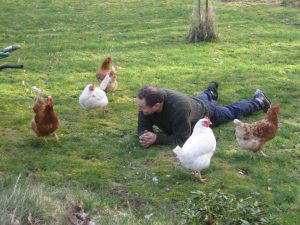
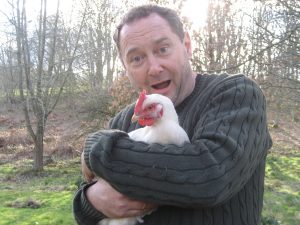
When Lee came to stay in early Spring, he swiftly fell in love too… especially with Yuki! My son, the hen whisperer…
It seems that older hens moult around 18 months, and chage (for Baldie) was a pitiful and to be honest rather unappealing sight, running around like a badly plucked bird escaped from a butcher. “She’ll be fine in a couple of months”, Liona assured, and indeed, by the end of May, Baldie no longer in any way resembled her name, and so became Snowy.

Initially we kept the ‘garden’ out of bounds, and still with so much land to wander, they would collect at the gate… Who was it who tested their wings to fly over first? Bravey, of course.
This tied in all too neatly with yuki charging under a car and turning into a bloody snowstorm. She is buried beneath a beautiful white azalea, being relocated due to the commencement of building work.
Next to go – commit a form of naive trusting suicide – was Hennypenny. Our road, the A923, is increasingly busy and despite it being a 40mph speed limit, drivers just put their foot down once out of the village. I have never knowingly let alone deliberately struck a bird or hedgehog or rabbit in all my years of driving, yet some unconscious men – mostly men – seem to enjoy taking lives on their machismo-driven ego trips.
My uncle Charles was a New Man decades before the phrase was even coined. He could spot a caterpillar – a ladybird even – on the road as he was driving, and would stop and get out to lift it to safety. Admittedly people did drive a lot more slowly in those far off distant days called the 1950s.
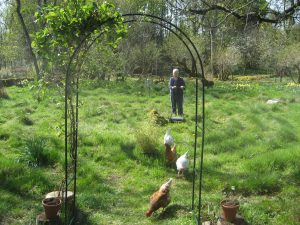
When I worked in the garden, they all followed in my wake, or even led the way ahead, pecking, scratching, investigating, chuntering amongst themselves, and pretty much eating everything…
Why did we not fence the birds in? Because in my own naive imaginings, free range meant free range, and with over an acre to wander around and forage, I could never understand why they were drawn to the road so often. Over the months though I have come to acknowledge hens as far brighter than ever imagined, but with great curiosity and an even greater generosity of affection.
Even now, sole survivors, Snowy and Ginger Rogers, now aged two, are standing in the doorway of this study where I am writing and regarding me quizzically. They could be asking where their friend is… they could equally be empathising with my sorrow.
I am shocked at how upset I am at Braveheart’s demise. I think I have cried more for her than for any of my relatives – mother, sister, aunt… Why, how could this be so? Millions of chickens are killed and eaten, chopped up and pulverised and every day, and yet here I am, devastated at the loss of one little bird.
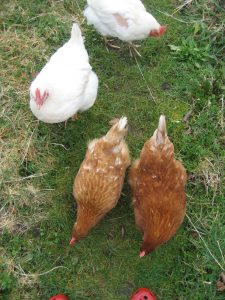
From the back, Chage (still with naked patches), Yuki, Ginger Rogers and Braveheart. Hennypenny? Behind me…
But I loved her, you see. I had grown to love them all, but Bravey had a special place in my own heart. She followed me around. She would nuzzle my ankles, cluck-cluck-clucking in that soft throaty way that happy hens do. She grew to like being stroked – none of them would allow any form of touching in the beginning; they would cower, as if afraid.
Reading this back I can’t believe I have blogged about hens. But then what the hell… they make me smile, they make me laugh. When I drew an Angel Card back in the New Year, it read JOY. This was something I sorely needed in my life at the time, and here it still is, just about.
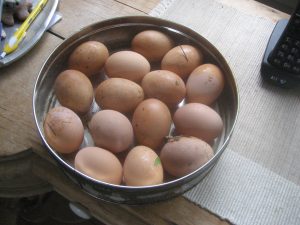
When after several days of finding no eggs in the coop’s nesting boxes, Akii began searching the garden, he found 15 eggs under bracken down by the burn… Not knowing how long they had been there, we gave them back to Nature, and are now more savvy about hens and their habits in general. We are left with the two older birds for now; I guess experience and innate chicken wisdom do count towards survival.

